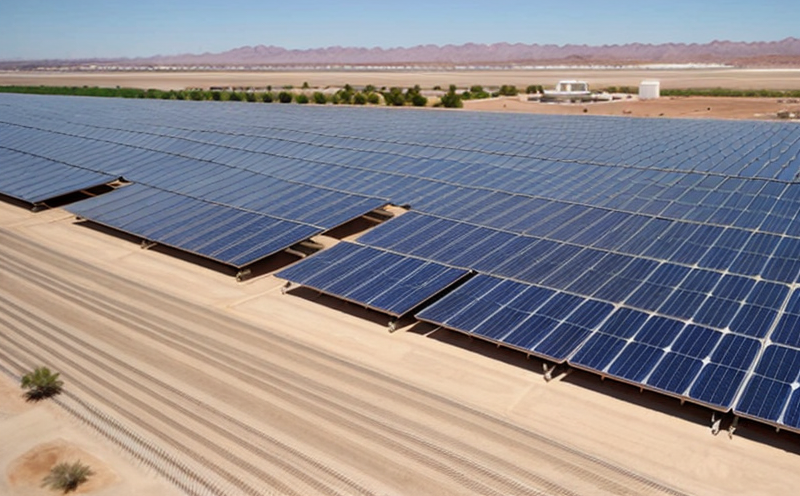ISO 22975-1 Durability Testing of Solar Thermal Collectors
The ISO 22975 series provides comprehensive guidelines for testing solar thermal collectors, ensuring their performance and durability under various environmental conditions. This service specifically focuses on the first part of the standard, which deals with durability testing. Durability is a critical aspect in the renewable energy sector, particularly for solar thermal systems where prolonged exposure to harsh weather can significantly impact collector longevity.
The durability test aims to simulate real-world operating conditions that collectors might encounter over their expected lifespan. This includes cyclic temperature variations, humidity, and corrosive environments, all of which can lead to degradation in performance or failure. By adhering to the ISO 22975-1 standard, manufacturers ensure their products meet stringent quality standards, enhancing reliability and consumer trust.
The testing process involves subjecting solar thermal collectors to controlled environmental conditions that mimic actual usage scenarios. This includes exposure to temperature cycles from freezing to boiling points, humidity levels up to 100%, and corrosive atmospheres like salt fog or sulfur dioxide. The test duration can vary based on the intended service life of the collector, typically ranging from weeks to months.
During the testing process, detailed monitoring is conducted using various sensors and instrumentation to record changes in key performance indicators such as heat transfer efficiency, thermal resistance, and structural integrity. These metrics are crucial for evaluating how well a solar thermal collector can withstand environmental stressors over time. The results of these tests provide valuable insights into potential areas of improvement for product design and material selection.
Compliance with ISO 22975-1 is essential not only for meeting regulatory requirements but also for gaining market access in many countries around the world. Many regions have adopted this standard as a benchmark for solar thermal technology, ensuring consistent quality across different manufacturers and models. This uniformity fosters confidence among consumers and policymakers alike.
Our laboratory employs state-of-the-art facilities equipped with advanced testing equipment capable of replicating diverse environmental conditions accurately. Our team comprises experienced professionals who possess deep expertise in both the theoretical aspects of solar thermal technology as well as practical application knowledge gained through years of hands-on experience. Together, they ensure that every test conducted adheres strictly to ISO 22975-1 requirements while providing accurate and reliable results.
| Parameter | Description |
|---|---|
| Cyclic Temperature Variations | Exposure to extreme temperature swings within a specified range. |
| Humidity Levels | Testing under high humidity conditions up to 100% relative humidity. |
| Corsrosive Atmospheres | Subjecting collectors to salt fog or sulfur dioxide environments. |
| Test Duration | Varies depending on the expected service life of the collector. |
Scope and Methodology
The scope of ISO 22975-1 durability testing encompasses a wide range of solar thermal collectors, including flat plate collectors, evacuated tube collectors, and parabolic troughs used in concentrated solar power (CSP) systems. The methodology involves subjecting these devices to controlled environmental conditions designed to replicate real-world usage scenarios.
- Cyclic temperature variations between -20°C to +120°C
- Humidity levels up to 95% relative humidity
- Corsrosive atmospheres such as salt fog or sulfur dioxide exposure
- Precise monitoring of heat transfer efficiency, thermal resistance, and structural integrity during the test period
Industry Applications
The durability testing described by ISO 22975-1 is applicable across various sectors within the renewable energy industry. Key applications include:
- Manufacturers of flat plate collectors for residential and commercial use
- Producers of evacuated tube collectors employed in large-scale solar thermal projects
- Developers of CSP systems utilizing parabolic troughs to generate electricity from concentrated sunlight
Customer Impact and Satisfaction
By participating in ISO 22975-1 durability testing, customers benefit significantly. These benefits extend beyond mere compliance with industry standards; they encompass enhanced product quality, improved reliability, increased market confidence, and ultimately better customer satisfaction.
- Increased consumer trust due to proven product performance
- Reduced warranty claims and returns associated with early failures
- Premium positioning in competitive markets by showcasing superior quality standards
- Enhanced reputation among stakeholders, including investors, regulators, and environmental groups





